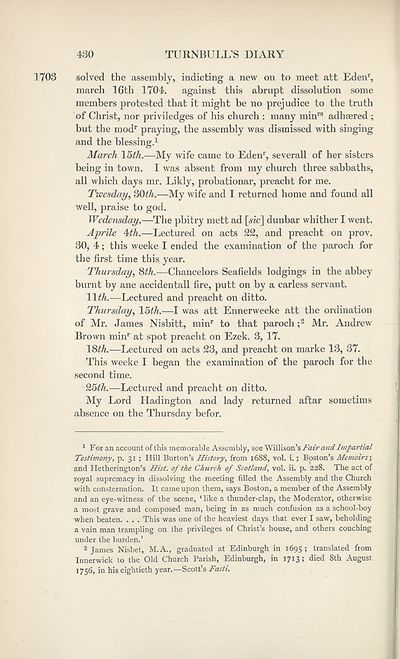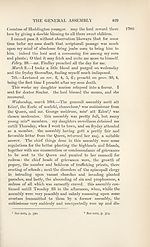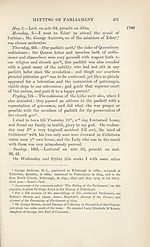Series 1 > Miscellany of the Scottish History Society (First volume)
(527) Page 430
Download files
Complete book:
Individual page:
Thumbnail gallery: Grid view | List view

430
TURNBULL’S DLVRY
1703 solved the assembly, indicting a new on to meet att Edenr,
march 16th 1704. against this abrupt dissolution some
members protested that it might be no prejudice to the truth
of Christ, nor priviledges of his church : many minrs adhaered ;
but the modr praying, the assembly was dismissed with singing
and the blessing.1
March 15th.—My wife came to Edenr, severall of her sisters
being in town. I was absent from my church three sabbaths,
all which days mr. Likly, probationar, preacht for me.
Twesday, 30£/«.—My wife and I returned home and found all
well, praise to god.
Wedemday.—The pbitry mett ad [sic] dunbar whither I went.
Aprile 1th.—Lectured on acts 22, and preacht on prov.
30, 4; this weeke I ended the examination of the paroch for
the first time this year.
Thursday, 8th.—Chancelors Seafields lodgings in the abbey
burnt by ane accidental! fire, putt on by a earless servant.
11th.—Lectured and preacht on ditto.
Thursday, 15th.—I was att Ennerweeke att the ordination
of Mr. James Nisbitt, minr to that paroch;2 Mr. Andrew
Brown minr at spot preacht on Ezek. 3, 17.
18£/i.—Lectured on acts 23, and preacht on marke 13, 37.
This weeke I began the examination of the paroch for the
second time.
9,5th.—Lectured and preacht on ditto.
My Lord Hadington and lady returned aftar sometims
absence on the Thursday befor.
1 For an account of this memorable Assembly, see Willison’s Fair and Impartial
Testimony, p. 31 ; Hill Burton’s History, from 1688, vol. i.; Boston’s Memoirs',
and Hetherington’s Hist, of the Church of Scotland, vol. ii. p. 228. The act of
royal supremacy in dissolving the meeting filled the Assembly and the Church
with consternation. It came upon them, says Boston, a member of the Assembly
and an eye-witness of the scene, ‘ like a thunder-clap, the Moderator, otherwise
a most grave and composed man, being in as much confusion as a school-boy
when beaten. . . . This was one of the heaviest days that ever I saw, beholding
a vain man trampling on the privileges of Christ’s house, and others couching
under the burden.’
2 James Nisbet, M.A., graduated at Edinburgh in 1695 ; translated from
Innerwick to the Old Church Parish, Edinburgh, in 1713; died 8th August
1756, in his eightieth year.—Scott’s Fasti.
TURNBULL’S DLVRY
1703 solved the assembly, indicting a new on to meet att Edenr,
march 16th 1704. against this abrupt dissolution some
members protested that it might be no prejudice to the truth
of Christ, nor priviledges of his church : many minrs adhaered ;
but the modr praying, the assembly was dismissed with singing
and the blessing.1
March 15th.—My wife came to Edenr, severall of her sisters
being in town. I was absent from my church three sabbaths,
all which days mr. Likly, probationar, preacht for me.
Twesday, 30£/«.—My wife and I returned home and found all
well, praise to god.
Wedemday.—The pbitry mett ad [sic] dunbar whither I went.
Aprile 1th.—Lectured on acts 22, and preacht on prov.
30, 4; this weeke I ended the examination of the paroch for
the first time this year.
Thursday, 8th.—Chancelors Seafields lodgings in the abbey
burnt by ane accidental! fire, putt on by a earless servant.
11th.—Lectured and preacht on ditto.
Thursday, 15th.—I was att Ennerweeke att the ordination
of Mr. James Nisbitt, minr to that paroch;2 Mr. Andrew
Brown minr at spot preacht on Ezek. 3, 17.
18£/i.—Lectured on acts 23, and preacht on marke 13, 37.
This weeke I began the examination of the paroch for the
second time.
9,5th.—Lectured and preacht on ditto.
My Lord Hadington and lady returned aftar sometims
absence on the Thursday befor.
1 For an account of this memorable Assembly, see Willison’s Fair and Impartial
Testimony, p. 31 ; Hill Burton’s History, from 1688, vol. i.; Boston’s Memoirs',
and Hetherington’s Hist, of the Church of Scotland, vol. ii. p. 228. The act of
royal supremacy in dissolving the meeting filled the Assembly and the Church
with consternation. It came upon them, says Boston, a member of the Assembly
and an eye-witness of the scene, ‘ like a thunder-clap, the Moderator, otherwise
a most grave and composed man, being in as much confusion as a school-boy
when beaten. . . . This was one of the heaviest days that ever I saw, beholding
a vain man trampling on the privileges of Christ’s house, and others couching
under the burden.’
2 James Nisbet, M.A., graduated at Edinburgh in 1695 ; translated from
Innerwick to the Old Church Parish, Edinburgh, in 1713; died 8th August
1756, in his eightieth year.—Scott’s Fasti.
Set display mode to:
![]() Universal Viewer |
Universal Viewer | ![]() Mirador |
Large image | Transcription
Mirador |
Large image | Transcription
Images and transcriptions on this page, including medium image downloads, may be used under the Creative Commons Attribution 4.0 International Licence unless otherwise stated. ![]()
| Scottish History Society volumes > Series 1 > Miscellany of the Scottish History Society (First volume) > (527) Page 430 |
|---|
| Permanent URL | https://digital.nls.uk/127087185 |
|---|
| Attribution and copyright: |
|
|---|
| Description | Over 180 volumes, published by the Scottish History Society, containing original sources on Scotland's history and people. With a wide range of subjects, the books collectively cover all periods from the 12th to 20th centuries, and reflect changing trends in Scottish history. Sources are accompanied by scholarly interpretation, references and bibliographies. Volumes are usually published annually, and more digitised volumes will be added as they become available. |
|---|


